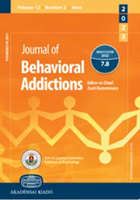Situational features of smartphone betting are linked to sports betting harm: An ecological momentary assessment study
Situational features of smartphone betting are linked to sports betting harm: An ecological momentary assessment study
Author(s): Nerilee Hing, Matthew Browne, Matthew J. Rockloff, Alex M.T. Russell, Catherine Tulloch, Lisa Lole, Hannah Thorne, Philip W. S. NewallSubject(s): Media studies, Individual Psychology, Social psychology and group interaction, Behaviorism, Substance abuse and addiction
Published by: Akadémiai Kiadó
Keywords: sports betting; smartphones; mobile gambling; gambling harm; problem gambling; situational characteristics;
Summary/Abstract: Background and aims: Smartphones extend the situational characteristics of sports betting beyond those available with land-based and computer platforms. This study examined 1) the role of situational features and betting platforms in harmful betting behaviours and short-term betting harm, and 2) whether people with more gambling problems have preferred situational features, engage more in harmful betting behaviours, and experience more severe short-term betting harm. Methods: An ecological momentary assessment analysed 1,378 betting sessions on sports, esports or daily fantasy sports, reported by 267 respondents (18–29 years; 50.9% male) over 10 weeks. Results: Factor analysis revealed five situational features of betting sessions: 1) quick, easy access from home, 2) ability to bet anywhere anytime, 3) privacy while betting, 4) greater access to promotions and betting options, and 5) ability to use electronic financial transactions. Regression models underpinned the analyses. Greater short-term betting harm was significantly associated with the ability to bet anywhere anytime, privacy when betting, and greater access to promotions and betting options. Betting sessions when these features were prioritised were more likely to involve impulsive betting, use of betting inducements, and betting with more operators. Respondents with more gambling problems were more likely to prioritise privacy and the ability to bet anywhere anytime; and to bet on in-game events, use promotional inducements, bet with more operators, and report greater betting harm. Discussion and conclusions: Certain situational features of sports betting are empirically associated with engagement and subsequent harm. Only smartphone betting combines all three features associated with betting harm.
Journal: Journal of Behavioral Addictions
- Issue Year: 12/2023
- Issue No: 4
- Page Range: 1006-1018
- Page Count: 13
- Language: English

